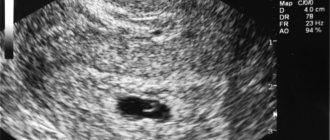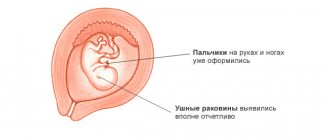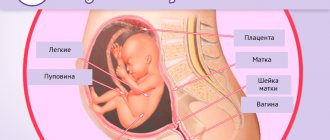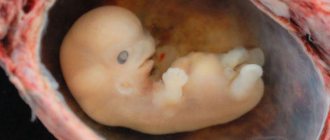Waiting for the birth of a child is the most difficult and at the same time wonderful time. Every woman thinks with trepidation about her baby, worries about him and hopes that the birth will be successful. This encourages her to consult more often with friends, parents, or turn to the Internet for tips to find out what is happening with the baby.
The 16th week of pregnancy is one of the calmest for the expectant mother. She is no longer bothered by morning sickness, and her hormonal levels are becoming smoother.
This article will tell you in detail about the weight of the fetus at 16 weeks of pregnancy, its size and development. In addition, the woman’s basic sensations during this period will be described, as well as the observed external and internal changes.
Size and weight of the fetus at the 16th obstetric week of pregnancy
During this period, the thoughts of the expectant mother are concentrated on whether her baby is developing correctly. In general, the norm is that the size of the fetus at the 16th week of pregnancy is:
- in height - about 11 centimeters;
- in weight - about 80 grams.
If you visualize a child, its size will be like an avocado. The 15-16th weeks of pregnancy are very important for the baby. It is during this period that his body becomes more proportional, his legs and arms become longer, and his head becomes less large. Thus, it is not difficult to imagine what the fetus looks like at the 16th week of pregnancy - its body takes on the familiar appearance in which it will very soon be born.
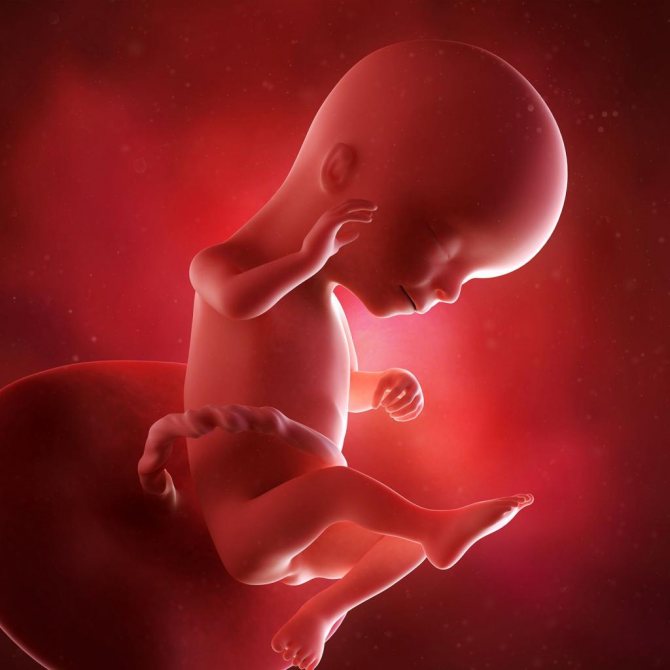
Necessary medical observations, tests and examinations
At this time, ultrasound is more informative. At this time, possible pathologies may appear, so it is possible to identify Down syndrome, heart disease, and other gross developmental disorders. The sex of the child is determined, the head can be distinguished, and the limbs can be examined.
During this period, it is important to conduct a study of the placenta - to determine its size and position. At 16 weeks it is recommended to visit a gynecologist. The doctor will be able to regularly measure the height of the uterine fundus and determine the heartbeat of the unborn child.
Standard tests at this time include urine and blood tests. A screening test is recommended. With the help of tests, you can determine how likely developmental defects are. Such tests are especially relevant for women at risk.
Fetal development
Gynecologists and obstetricians claim that at the 16th obstetric week of pregnancy, the baby’s skeleton and muscles are actively developing. This is all very important for the baby.
The baby’s face has already formed a mouth, eyes, eyebrows and eyelashes, as well as ears. Now he is getting used to his changes and begins to “experiment” - closing his eyes, opening and closing his mouth, moving his fingers. The spine and tiny back muscles gain strength, so the baby can slowly straighten his neck.
Thanks to the developing facial muscles, the child is even able to make several expressive expressions and frown. Literally by the middle of the 16th week of pregnancy, the development of the fetus will allow it to begin to turn its neck left and right.
The baby's skin is still transparent this week. The blood vessels of the fetus are clearly visible through it.
Baby's internal organs
In addition to the weight, appearance and size of the fetus at the 16th week of pregnancy, what happens to its organs is also of great importance. During this period, his bladder, liver and kidneys begin to actively work. His internal organs begin to contract, and they also secrete enzymes.
The baby’s digestive organs and cardiovascular system are actively working. The fetal heart rate at 16 weeks of pregnancy is approximately 150 beats per minute. During this period, the baby’s heart pumps about 25 liters of blood per day. Subsequently, this amount will increase as the child develops.
Child's vision and hearing
The baby begins to make slight movements with his eyes from side to side, which have already begun to perceive light. However, the child's eyelids are still closed.
It is important that this week the baby’s hearing is actively developing. Now he can hear his mother's voice. In fact, studies have shown that babies who hear a song while in the womb recognize the same tune after birth. Therefore, the 16th week of pregnancy is a great time to choose a lullaby. Doctors recommend starting to communicate with the baby during this period. Talk to him in a calm tone so that he remembers it. This will help in the future because the baby will already know that the mother’s voice is a kind of soothing “medicine”.
Ultrasound for a pregnant woman
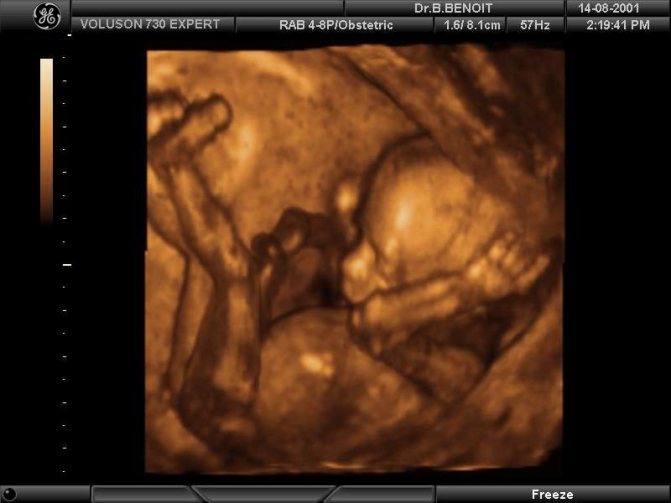
The baby's appearance changes quite a lot at the sixteenth week. His ears move to his head, where previously they were on his neck. True, the fetus does not hear yet, but perceives all vibrations with its skin. It is still very thin and smooth, reddish in color.
All fetal vessels are visible through it. To protect the skin from a humid environment, tonic hairs called lanugo appear on its surface.
His eyes also move into place, but they are still closed.
During this week of development, facial expressions are actively formed in the fetus. He may already be smiling or wincing. The grasping reflex is also activated in the embryo. In ultrasound photos you can sometimes see how he squeezes the umbilical cord with his fingers.
As for the internal organs, they also continue their active development. The heart, which began to beat in the fifth week, now beats more actively. If at the beginning of the formation of the main muscle the heart rate was 80 beats per minute, now it reaches 157. At week 16, the fetus begins to form its own immune system.
The main innovation is that the liver, which previously performed hematopoietic functions, now transfers this function to the bone marrow.
At this stage of development, the female fetus has already formed the uterus and other genital organs. The ovaries contain five million eggs. A male fetus already has all the male reproductive organs, but the testicles are still in the abdomen. Then they will descend into the scrotum. During an ultrasound, the doctor will be able to tell the sex of the child if his genitals are clearly visible.
The 16th week of pregnancy is characterized by the fact that the fetus becomes mobile, training its muscles. Therefore, a woman can distinguish movements.
It is worth noting right away that movements at this stage of development are not felt by all women. Most often, they can be felt by those who are preparing to give birth to their second child. If a woman is overweight, it is much more difficult to feel movements. However, even if a woman does not have extra pounds, the baby’s first movements are very difficult to distinguish from other processes occurring in the abdomen. At week 16 they will resemble the movement of gas bubbles.
The expectant mother can feel the first clearly perceptible and distinguishable movements only at 22 weeks, and in some cases even later.
A woman's body and her fears about excess weight
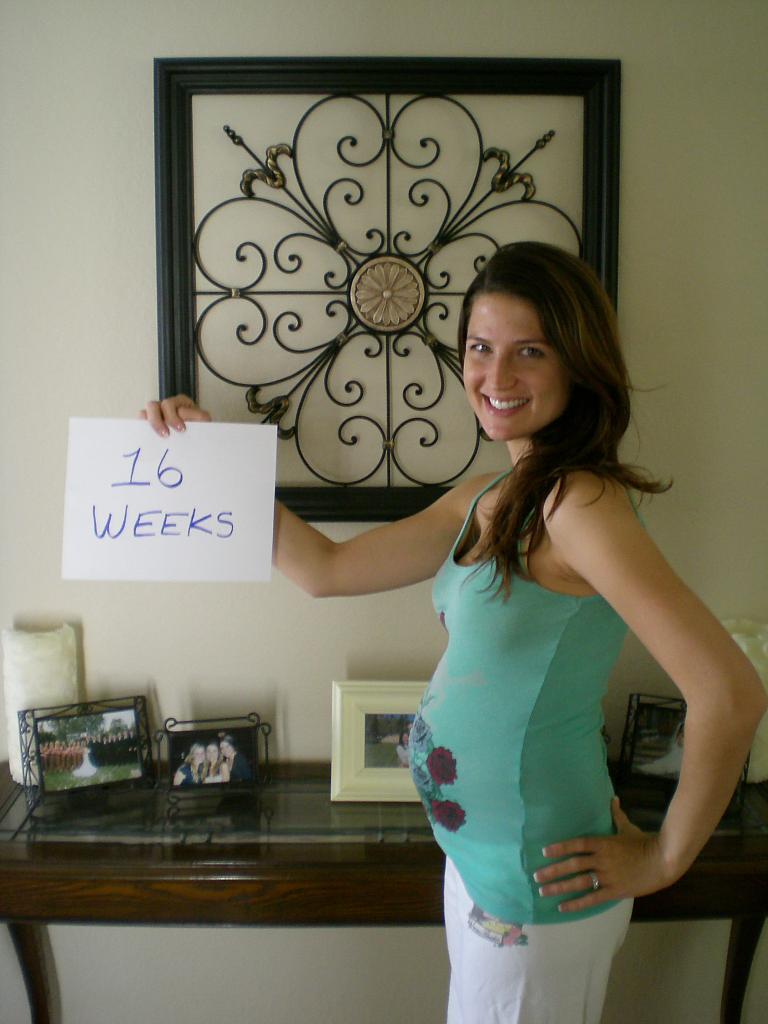
The 16th week of pregnancy is the period when the expectant mother is already accustomed to the fact that her body is changing. However, every day she is visited by more and more new sensations that can frighten or alarm.
At the 16th week of pregnancy, strangers can visually determine the interesting position of the girl. If a few weeks earlier those around her could still wonder: “Has she gained weight or is she pregnant?”, now everything becomes clear at first glance. Therefore, it will certainly not be possible to hide the pregnancy.
In general, it is difficult for a woman to understand whether she is gaining weight or whether her belly is simply getting bigger because of the baby. During this period, it is important to forget about all fears and begin to accept the body as it is. Even if a few extra pounds appear, it’s not a problem. The most important thing is to remember that healthy eating is important for your baby's health.
During this period, you should minimize the consumption of food “junk” (fast food, chips and other snacks, carbonated drinks, etc.) and increase the amount of nutrient-rich foods in your diet. Exercise is also important. You should discuss this point with your doctor who monitors the progress of your pregnancy and find out what kind of physical activity will be beneficial. This approach will allow you to control your weight and keep yourself in good shape.

Why do pregnant women have discharge?
Many women are concerned about discharge at 16 weeks of pregnancy. We must not forget that vaginal discharge is a normal process that allows us to assess the state of the mother’s health and identify any problems that have arisen. Normal vaginal discharge from a pregnant woman should be light gray or clear in color and have a slightly sour milky smell. The presence of leucorrhoea clearly indicates the presence of infections, and for prevention and timely treatment it is necessary to do a flora analysis.
A woman should carefully monitor any changes in color and odor, because discharge at week 16 is a clear criterion for her health.
Many women are concerned about the question of why pregnant women have discharge and how to determine whether it is of normal color and consistency. To understand this, it is worth remembering that at the 16th week of pregnancy, yellow discharge is an indicator that some kind of problem has arisen in the body. During this period, you should not rely on the fact that everything will go away on its own, because this can jeopardize the baby’s health.
You also need to be prepared for the fact that all the fungal diseases that have been “dormant” in a woman’s body will worsen and appear outside. Many people complain of yellow discharge at 16 weeks of pregnancy. In this case, you should definitely consult a doctor. Thrush must be treated before childbirth without fail. Otherwise, the infection may be spread to the child’s mucous membranes. However, you should definitely consult a doctor about all this, since thrush is not dangerous for the development of the child, and its treatment during pregnancy may be contraindicated. It is worth paying special attention if pink or bloody discharge begins to appear from the vagina at 16 weeks.
Women need to know what discharge occurs during pregnancy and be sure to consult a doctor if it changes color to brown or reddish.
Ultrasound
In rare cases, a doctor may prescribe an ultrasound for a woman at 16 weeks of pregnancy. This period is not included in the planned schedule of ultrasound examinations, and the reason for this can only be the girl’s complaints, as well as poor results of other tests. If you still had to do an ultrasound at the 16th week of pregnancy, then the girl can see the almost formed body of the unborn child.
Many women are concerned about the question of whether it is possible to find out the sex of the child using an ultrasound at this time. Don't be upset, but the answer will be negative. An ultrasound diagnostic specialist will not yet be able to determine the sex of the child, since his genital organs are just beginning to form. However, the doctor will definitely tell you about the position, weight and size of the fetus at the 16th week of pregnancy.
Ultrasound screening of the fetus at 16 weeks
At this stage of pregnancy, the doctor rarely prescribes an ultrasound. However, if he suspects the development of one or another defect in the child or a threat associated with the improper functioning of the female genital organs, he will send the expectant mother for an ultrasound.
An ultrasound is done at 16 weeks if for some reason the examination was not done during the first three months.
Also, at a period of four months, a woman does an ultrasound if the doctor suspects cervical insufficiency. This diagnosis means premature dilation of the uterus, which is very dangerous for the normal course of pregnancy. Only an ultrasound at this time can confirm it.
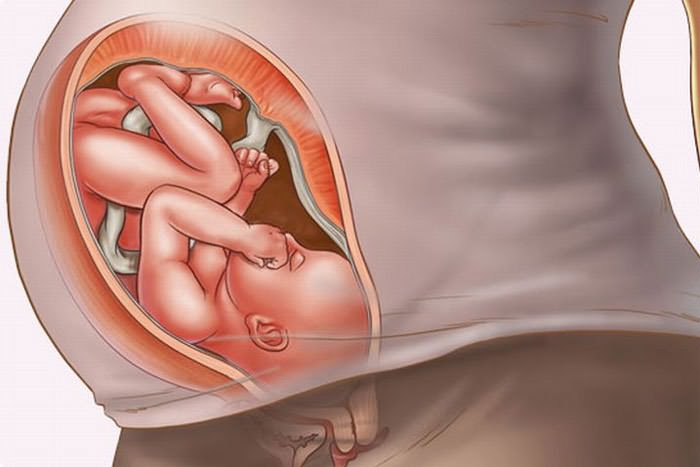
In addition, if a woman wants to find out her gender as quickly as possible, she can visit the ultrasound room on her own without orders from an obstetrician-gynecologist. However, as practice shows, it is quite difficult to discern the sex at four months.
An ultrasound at 16 weeks is unscheduled, so it is performed on a woman only in special cases.
What can a doctor detect using an ultrasound photo?
Most often, he looks for signs of chromosomal abnormalities. A marker of pathology is a too thick collar zone, which indicates the development of Down syndrome. Another marker is the nasal bone. If by the fourth month it is not visible in the ultrasound photo, then there is a risk of developing trisomy. In addition to chromosomal abnormalities, the doctor can identify pathologies of the neural tube, spine, and internal organs, since the image at this stage is already quite clear.
Also, at a period of four months, the doctor can detect the presentation of the baby. Sometimes the baby turns over so that his pelvis is at the entrance to the vagina. Women are sure that the main difficulty in this situation is related to childbirth, however, such a presentation has other disadvantages.
In this position, the fetal heart rate increases and its overall tone is reduced. It is uncomfortable for the embryo to move, because it can only move its legs and arms. Therefore, when a breech presentation is detected, everything possible must be done to ensure that the baby turns his head towards the exit of the uterus.
Other tests
The antenatal clinic monitors the condition of the mother and her unborn child, so it is important to follow the recommendations of specialists and take all tests on time. At the 16th week, as a rule, the following studies are considered planned:
- a triple test that determines the level of hCG (carried out to make sure that the child is developing normally and to identify defects in time);
- determining the height of the uterus;
- blood pressure measurement;
- weighing;
- blood and urine tests.
In rare cases (if a woman has serious complaints or the doctor suspects any abnormalities), a study such as sampling amniotic fluid from the uterine cavity may be prescribed. This procedure is necessary in order to identify (reject or confirm) any deviations in the development of the baby. Well, as noted earlier, an ultrasound may be prescribed if it is necessary for medical reasons.
Unpleasant sensations at 16 weeks of pregnancy
Although pregnancy is considered one of the most wonderful periods in a woman’s life, it is not always easy. Every week she experiences different symptoms. As experts note, at the 16th week a girl may feel the following:
- Nasal congestion and bleeding. Some expectant mothers may experience nasal problems caused by increased blood circulation and increased hormone levels. Although nosebleeds are normal during pregnancy, they are not always easy to manage. You can minimize bleeding and nasal congestion by regularly humidifying the air in the room and lubricating the edges of your nostrils with Vaseline. If such manifestations make breathing very difficult, you should consult your doctor about what sprays or drops can be used to alleviate the condition.
- Lower back pain. This is one of the most common symptoms that a woman may experience during pregnancy. There are several ways to reduce discomfort. For example, it is worth discussing with your doctor the possibility of taking warm baths or taking relaxing herbs. A good way to relieve lower back pain is to regularly relax your back muscles by stretching. In addition, to keep the negative impact on the lower back as small as possible, it is important to avoid high-heeled shoes and pay attention to postures while resting.
- Dizziness: This condition may be a side effect of hormones that cause changes in blood circulation during pregnancy. If you feel dizzy, you need to lie down on your left side and just lie there for a while. If this symptom does not go away, you should consult a doctor.
- Bleeding gums. Pregnancy hormones often cause gums to become inflamed, making them more susceptible to bacteria, irritation and bleeding. In general, this is considered the norm. But it is important to remember that you need to regularly brush your teeth with toothpaste and floss. Also, do not forget about periodic visits to the dentist during pregnancy. Consulting a specialist will help prevent gum disease.
- Dilatation of veins. The additional load on the circulatory system causes pregnant girls to experience leg pain. Often, it is at the 16th week that the expectant mother may notice that the veins in her legs have greatly expanded.
- Copious discharge. Vaginal discharge is actually beneficial as it protects the birth canal from various infections. However, they can make you feel uncomfortable. But don’t give in to the temptation and constantly wash them with water or using feminine wet wipes for intimate hygiene. By keeping the microflora in its natural form, there is a greater chance of protecting yourself and the unborn child.
- Skin change. The increased volume of blood in the blood vessels and pregnancy hormones causing increased fat production can make a pregnant woman's skin appear flushed and oily in appearance. Dark pigment spots may appear. However, do not be alarmed, because they usually disappear after the birth of the child. In addition, various rashes, irritations, redness, etc. are possible. To get rid of such troubles, you should wash your face several times a day with mild baby soap and warm water. In addition, it would not be superfluous to consult a dermatologist, who will recommend the best cosmetics that are completely safe for the health of the expectant mother and her baby.
It is worth remembering that these unpleasant sensations are somewhat normal. If they appear suddenly, but quickly pass, there is nothing special to worry about. However, if the pain in the lower back does not go away or dizziness has become a constant companion, you need to consult a doctor who will examine the woman and tell you for sure whether she should worry or not.

Cold at 16 weeks of pregnancy
Often girls go to the doctor this week with complaints of fever and general weakness, often mistaking these symptoms for a cold. However, it is worth remembering that during this period, an increase in temperature to 37 degrees is normal.
This fact is due to the fact that the female body works in an enhanced mode. It ensures the vital functions of not only the mother, but also the child. Therefore, do not be alarmed by a slight increase in temperature.
However, if a runny nose or cough appears, then we are talking about a cold. It is important to consult a doctor as soon as possible, who will give general recommendations and select the safest therapy.
During pregnancy, do not forget that many medications are prohibited for the expectant mother. Therefore, you should not self-medicate. In addition, you need to remember that you cannot let the disease take its course, because the deterioration of the girl’s general condition and an increase in temperature above 38 degrees can be dangerous for the health of the unborn child.

What happens in a woman’s body at 16 weeks of pregnancy?
During this period, thanks to a noticeably rounded tummy, the woman fully begins to feel pregnant. Many people notice that their hair and nails begin to grow faster.
In general, a woman at this stage of pregnancy looks very attractive.
This week, the uterus begins to actively grow, the amount of amniotic fluid in it increases. This entails some inconveniences. Pressure of the uterus on the sciatic nerve causes pain spreading to the buttocks and lower extremities. Due to pressure on the diaphragm, it becomes difficult for a woman to breathe.
The belly grows - and this causes pain in the back, hips, and groin. Problems such as itchy skin and stretch marks may also appear.
A pregnant woman may notice that her shoes have become tight. This is partly due to weight gain, partly due to swelling. The expectant mother may have to purchase shoes one size larger during pregnancy.
Changes in a woman’s body at the 16th week of obstetric pregnancy
Changes in a woman’s body at the 16th obstetric week of pregnancy
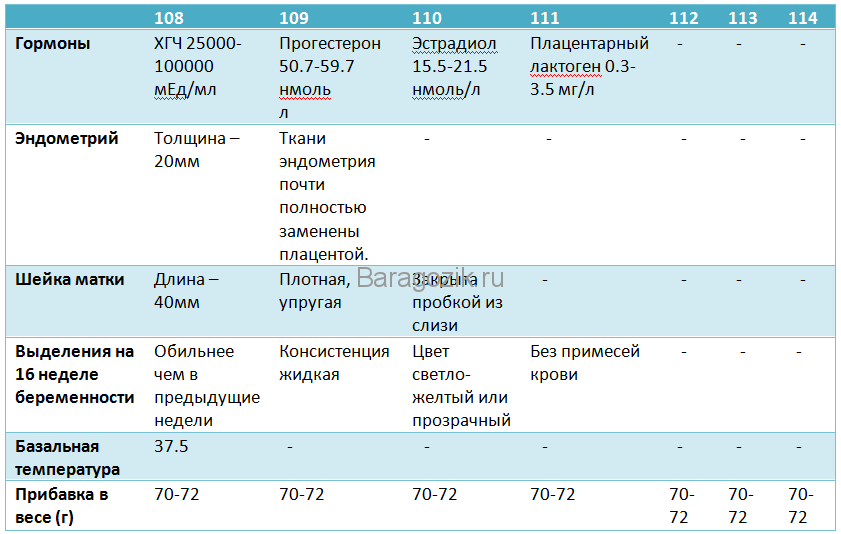
Chest and abdomen of a woman at 16 weeks of pregnancy
There are no special changes in the breasts compared to previous periods. Its size does not change, and for some it continues to grow. A venous pattern appears on the chest.
In addition, in many pregnant women, the nipples increase in size. Painful sensitivity in the nipples and breasts may disappear, but this does not always happen.
If fluid is constantly leaking from your breasts, it is very important to maintain hygiene, otherwise an infection may get into the milk ducts.
If this is your first pregnancy, your growing belly is already visible to others in tight-fitting clothes.
During multiple pregnancies, it grows much faster. Therefore, by the 16th week, the size of the abdomen may already be of impressive size.
Cramped calves during pregnancy - what does it mean and how to help?
First movements during pregnancy
Usually, the first, barely noticeable, tremors are noticed by mothers between 14 and 26 weeks, but most often only after 18.
If a woman does not feel the baby’s movements yet, there is no need to worry. Up to the 20th week there may be no movements at all.
Expectant mothers need to remember that the baby’s activity at this stage is not constant, so movements are still intermittent.
Video: 16th week of pregnancy
Recommendations for women
There are a number of tips to help you feel better. Doctors recommend paying attention to your wardrobe and putting away tight, restrictive clothes and high-heeled shoes. Loose dresses, tunics and trousers will ensure proper blood circulation, and low-heeled shoes will reduce the load on the lumbar region of the back.
This week, girls are recommended to take frequent walks in the fresh air. This will help enrich the blood with oxygen, which has a positive effect on the development of the child.
It is important to pay special attention to your diet. The diet should always include fresh (seasonal) fruits and vegetables, plenty of clean water, and dairy products containing calcium. Proper nutrition is a great way to fill the body with useful substances without much effort, so do not neglect this rule.

It is recommended to do a light massage of the legs, back and abdomen. You can additionally consult with your doctor, who will tell you how to properly massage your body yourself. This will help reduce pain in the legs, back and prevent the appearance of stretch marks in the abdominal area. You can make an appointment with a professional massage therapist, but you should be very scrupulous in your choice and discuss with him in advance the fact that massage should not jeopardize pregnancy and the health of the child.
induced birth at 16 weeks
Unfortunately, I had to go through this sad event. Before this, I searched for information on the Internet for a long time, but I could not find anything about how exactly this process occurs. They write a lot about the indications for artificial childbirth and their consequences, but what it is remains a mystery.
It so happened that during this first long-awaited pregnancy, my child was diagnosed with Down syndrome. Those who don’t know, find this out with the help of chorionic villus biopsy or amniocentesis, about which a lot has been written in detail on the baby blog, so I won’t dwell on it. She did a chorionic villus biopsy (placentopuncture) at 13 and a half weeks. The result (99% accuracy) can be obtained the next day, and in our case it was sad - 47xy+21, which means that we had a son with a chromosomal abnormality.
We thought and suffered for a long time, and decided that we would not be able to live normally if the child had such a diagnosis. I won’t say anything about the ethical side of the issue - each family decides it differently. We decided to go for an abortion.
In this case, interruption takes place in the form of an artificial birth and preferably after 16 weeks, because from this period the uterus begins to contract well. So, about the process. I was admitted to the hospital on Friday and spent three days preparing for childbirth in the form of calcium injections, noshpa and vitamins. On Monday I received three mefipristone tablets, which were supposed to block the hormones that support pregnancy. Nothing happened to me on Monday—and it shouldn’t have. I didn't feel anything. On Tuesday, after 24 hours, I received 4 progesterone tablets, which needed to be dissolved at 12, 15 and 18 hours. These pills immediately start the process of childbirth: the stomach begins to pull, and gradually intensifying contractions begin. After you dissolve the first tablet, you no longer belong to yourself.
For those who haven't given birth (and I haven't given birth and didn't know what it was), contractions are pain similar to period pain, but much stronger and more terrible. As labor progresses, they turn from the usual monthly whining into regular, intensifying and then subsiding pain in different parts of the uterus - first from above, then closer to the bottom and perineum. Since at 16 weeks the body is in wild shock from the fact that it suddenly unexpectedly has to give birth, the contractions also turn out to be incorrect, i.e. not as they are described on the Internet (that they should be regular, once every few minutes, etc.).
At 12, my stomach began to pull weakly, and nerve impulses began to pass through the uterus. At 18, the pain was already noticeable, and the doctor saw that I had half a finger open. At 10 p.m. the pain had to be endured, not just endured, but it was well tolerated while walking. At 10:30 p.m. my water broke and I felt like a bubble was bursting inside. This was unexpected, and I ran to tell the nurse that it was time to pay attention to me. By the way, when you are in the hospital, you must definitely warn the doctor on duty that you will give birth, because as I was told, this usually happens at night. Just so they know about you. The nurse called the doctor and I was diagnosed with an opening of 1 finger. A big opening, as you might guess, is not required to give birth at 16 weeks, and I was told to go ahead and wait. They said that I would give birth after 12 and the doctor somehow pumped out the remaining water from me with her fingers. When the cervix dilates, a little blood flows - again, this is for those who, like me, have never given birth.
After the water broke out, the contractions became real, before that it was just a constant aching pain that periodically (every 3-5 minutes) intensified. Real contractions are pain, then its complete absence. And so on for a couple of hours. At 00.20 somewhere I went to walk around and it seemed to me that I wanted to go to the toilet in a big way. In fact, it turned out to be an attempt. Attempts occur by themselves, this is a wave that pushes the baby out of the uterus. You don’t have to push, the body does everything itself.
After this effort, I realized that the baby was already sticking out of me halfway and feet first, and fearing to drop him, I rushed with the nurse to the operating room. There, already in a chair with a second push, the child was born into the doctor’s arms, and the placenta came out almost immediately. A child at 16 weeks is not very big, about 15 centimeters in length, brown in color and it is better not to look at him. I saw only legs folded into a lotus with fingers and nails on them, and decided not to look further, so as not to go crazy. The baby with the placenta is immediately taken away somewhere. At first I thought that I would ask him to be taken away to bury him, but firstly this is impossible, they don’t give away the fruit, and secondly it is better for your psyche.
By that time, a bunch of people had already gathered and they began to put an anesthesia needle on me to do the curettage. It is done after an artificial birth, because it is not natural and the immature placenta cannot come out completely on its own. You will not notice the moment of transition into a state of anesthesia, and you will not feel what they will do to you. I woke up with ice on my stomach, and a few minutes later I was already in the room with oxytocin in a drip. My stomach didn't hurt and I felt comfortable.
In the morning - a flat, non-pregnant belly, oxytocin injections to contract the uterus and cramping pain. I was promised that there would be discharge for about a week. It's the second day. Let's see what will happen next.
You can get pregnant after this terrible procedure in at least six months.
There is nothing to talk about moral and psychological aspects, the mental state is unbearable, I want to climb the wall. There was a birth, but no child. I understand, of course, many people terminate at a later date without any remorse, but for me it’s just the opposite. The maternal instinct kicks in anyway.
And one more thing: my chest hurts. She's filled up, so she needs to wear a tight bra one size smaller.
PS: I’m writing four years after an induced birth. Girls, in principle, my experience is described here in as much detail as possible, there is no point in asking questions in PM or sympathizing (especially since everything is already in the past, experienced and forgotten). I rarely come here and even more so I might miss your message. After artificial birth there is life, two years later I had a wonderful, healthy son, you can also read about my ecstatic birth in my diary. Good luck to everyone and everything will be fine, maybe not right away but it will be.
